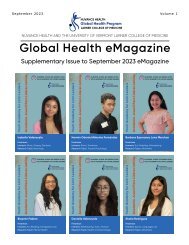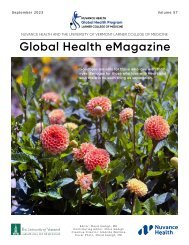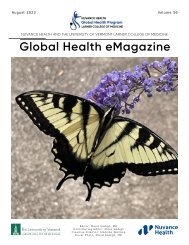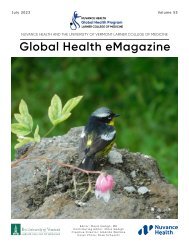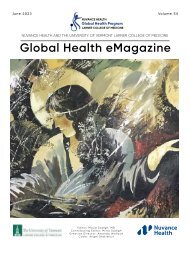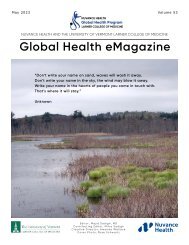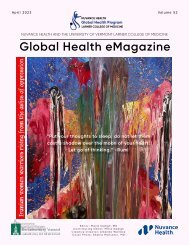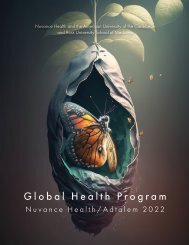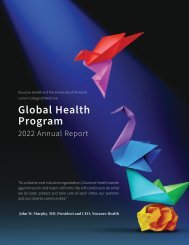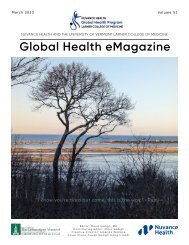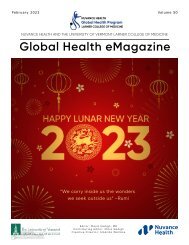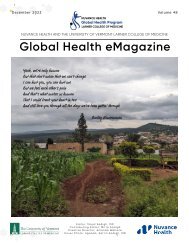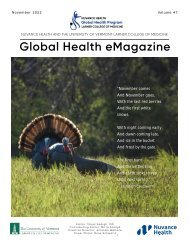climbforacause2019_rev
You also want an ePaper? Increase the reach of your titles
YUMPU automatically turns print PDFs into web optimized ePapers that Google loves.
would tell you to come down this mountain." During our email exchange in the days after the<br />
hike, he told me that it was these words that ultimately helped him decide to descend.<br />
Fourth, the sky on the final descent was completely pellucid, the beauty of the stars and<br />
galaxies shining courage and gratitude onto us as we put one foot in front of the other in<br />
the dark. We could easily stretch our hand to gather a few to store in our hearts for future<br />
moments of challenge or distress. The descent was also remarkably beautiful, with the last<br />
hour marked by snow, hail, wind, and finally rain. We were absolutely drenched, with our<br />
multiple layers clinging to our skin, but it was an absolutely beautiful and cathartic release.<br />
One of our guides told us that snow on Kilimanjaro is the mountain’s gift. And it really is a gift.<br />
The last thing that made this climb special was seeing past the mountain’s overwhelming<br />
beauty and into the essential roles and sacrifices of the porters and guides. Though I have<br />
always sung their praises for their hard work and talent, I have never seen firsthand how<br />
caring they can be until I watched them help Mitra on that final ascent. As she massaged her<br />
head during one of our breaks, tears rolling down her cheeks as a result of the sheer force of<br />
tension, our guide encompassed her head in his fingers and helped push the pain away. When<br />
we finally reached the top, he picked her up and lifted her with such sincere excitement and<br />
pride. I was truly moved.<br />
Comprised mostly of the Chaga people who reside close to the mountain and the Massai<br />
who populate the Tanzania-Kenya border, members of the climbing teams are incredibly<br />
hardworking and kind. These porters and guides are some of the most authentic people<br />
one can encounter. Nobody that reaches Uhuru peak can do it without their support - in<br />
the practical capacity of carrying our gear and providing our meals, the health capacity of<br />
monitoring our wellness, or the emotional capacity of encouraging us to continue in times of<br />
discouragement. Tragically, many of these climbing staff lack proper gear, which means that<br />
some die from hypothermia if caught in the rain. Porters make only 8USD a day, and guides<br />
just twice that amount. We are hoping to fundraise to provide gear for these teams so that<br />
they can at least be better protected from the elements.<br />
How did your body respond to the first hike versus this latest hike?<br />
Climbing Kilimanjaro is akin to a mother who, after undergoing difficult labor, vows to never<br />
give birth again. But as soon as she rocks the baby in her arms, she forgets about the pain.<br />
She sees only beauty.<br />
During my first climb, I came down with dysentery - fever and diarrhea - acquired from poor<br />
sanitation in the camp sites. I thought I would need to descend, but my condition improved<br />
substantially after taking antibiotics. I knew the climb was difficult and cold, but the mountain’s<br />
beauty was all I remembered, such that I decided to climb several times more. I experienced<br />
claustrophobia and panic attacks from low oxygen during a few of my subsequent climbs, but<br />
I didn’t have that problem this time. Though I am now seventeen years older than I was at the<br />
time of my first ascent, I don’t think my body responded differently to elevation beyond hiking<br />
more slowly, carefully, and thoughtfully. Descending, however, was harder on me because of<br />
an injury in my medial meniscus in both knees from years of running.<br />
64




